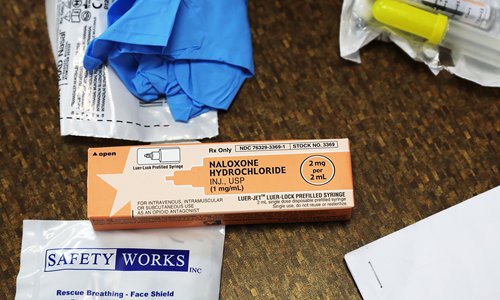HOME >> BUSINESS
Opioid crisis litigation pile-up against US drugmakers reaches legal critical mass
Source:Global Times Published: 2019/10/21 20:48:40

Inset: A box of Naloxone Hydrochloride, an antidote used to block opioid effects, especially overdoses. Photo: CFP
The pressures to settle opioid-related litigation against US companies have reached critical mass. A combined $50 billion of proposed settlements is now on the table. Drugmakers and distributors prefer one-off payments, even large ones, rather than open-ended uncertainty. Meanwhile localities want cash as soon as possible. That's a recipe for deals.
Almost 400,000 Americans died of opioid overdoses between 2009 and 2017, according to the Centers for Disease Control and Prevention, in part because of over-prescription. There are about 2,600 ongoing cases against drugmakers and distributors brought by states, localities and other organizations, most of which are consolidated before a judge in Ohio. A bellwether trial involving two of that state's counties began on Monday. Four drug firms, including Johnson & Johnson (J&J), have already settled with the counties.
The worry for the companies concerned is that any large award following the trial will set a baseline for even bigger future settlements. To forestall this, three big drug distributors, AmerisourceBergen, Cardinal Health and McKesson, are offering $18 billion in total. J&J is proposing a $4 billion deal. Teva Pharmaceutical Industries, an $8 billion generic-drug firm which is losing money and carries $26 billion of debt, hopes therapies valued at $15 billion combined with services worth almost as much again will prove sufficient.
Opioid addiction has compounded local fiscal problems. Places with the strongest legal cases need the extra cash desperately. Ohio's Cuyahoga and Summit counties, which have suffered decades of deindustrialization and are the plaintiffs in this week's trial, have been willing to negotiate.
The numerous parties involved on both sides make a global settlement challenging, however. Some plaintiffs may want to press their luck, and companies that have displayed the most egregious conduct will have a harder time settling. Cash is a powerful sedative, however, so strong firms like J&J are best placed to end the suits. Others like Teva, may offer in-kind settlements, but valuing these presents complications.
The Sackler family's Purdue Pharma, widely seen as the detonator of the US opioid epidemic, has proposed a settlement which includes in-kind treatments, and the company has filed for bankruptcy. About two dozen states thus far oppose the deal. For cash-rich firms and those less central to the crisis, though, an end to litigation is looking closer.
The author is Robert Cyran, a Reuters Breakingviews columnist. The article was first published on Reuters Breakingviews. bizopinion@globaltimes.com.cn
Posted in: INSIDER'S EYE